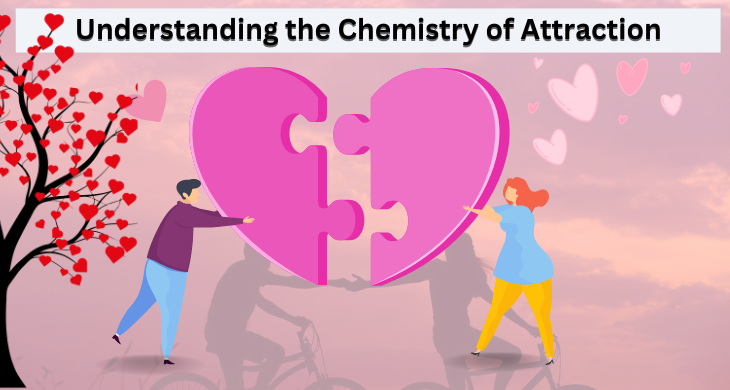Love is a profound human experience that has captivated poets ,artists ,and philosophers for centuries. It encompasses a complex array of emotions ,behaviors, and sensations. While love may seem mysterious, recent scientific research has shed light on the chemistry behind attraction and attachment. In this article, we will explore the fascinating science of love, diving into the role of neurotransmitters, hormones, pheromones, genetics, and psychological factors that contribute to the magic of human connection.
The Role of Neurotransmitters
Neurotransmitters are chemical messengers in the brain that play a crucial role in our emotions and behaviors. Two neurotransmitters ,in particular, have been closely linked to love and attraction: dopamine and serotonin.
- Dopamine: The pleasure neurotransmitter
- Dopamine is often referred to as the “pleasure neurotransmitter” because it plays a significant role in our experiences of reward ,pleasure ,and motivation.
- In the context of love ,dopamine is responsible for the intense feelings of attraction and desire we experience When we meet someone we are attracted to.
- When we are in love ,our brain releases dopamine ,creating a sense of euphoria and reinforcing our desire to be with our romantic partner.
- Serotonin: The mood regulator
- Serotonin is another Neurotransmitter that Influences our Emotions and overall mood.
- In the realm of love ,serotonin helps regulate our emotional state and contributes to feelings of contentment and happiness in a relationship.
- Low levels of serotonin have been associated With Obsessive thinking and infatuation ,Which can be a Characteristic of early -stage Romantic love.
Hormones and Love
In addition to neurotransmitters ,hormones also play a significant role in shaping our experiences of love and attraction. Two key hormones that are closely linked to love are oxytocin and testosterone.
- Oxytocin: The bonding hormone
- Oxytocin is Often referred to as the “bonding hormone” or “cuddle hormone” because it is released During moments of Physical touch and Intimacy.
- This hormone is involved in social bonding ,trust ,and the formation of strong emotional connections.
- Oxytocin’s release is particularly prominent during childbirth ,breastfeeding, and sexual activity, facilitating bonding between individuals.
- Testosterone: The hormone of desire
- Testosterone is primarily known as the male sex hormone ,but it is also present in females ,albeit in smaller amounts.
- Male & female Sexual desire & attraction are Influenced by Testosterone.
- Higher levels of testosterone have been associated with increased sexual desire & libido ,while lower levels may contribute to decreased interest in sex.
The Power of Pheromones
Pheromones are chemical substances emitted by individuals that trigger Specific responses in others of the same species. While pheromones have been extensively studied in animals ,their role in human attraction is still a topic of ongoing research.
- Definition and function of pheromones
- Pheromones are odorless chemical signals that can influence behavior ,Including attraction & mate selection.
- These chemical signals are Detected by the Vomeronasal organ ,a specialized sensory Structure in the Nose.
- The function of pheromones in mate selection & attraction.
- Studies have Suggested that Certain pheromones may have an impact on Human Attraction and influence perceptions of Attractiveness.
- For example ,research has found that women may be more attracted to men whose major histocompatibility complex (MHC) genes are different from their own ,as indicated by body odor.
- Pheromone studies and their implications for human Behavior.
- While the scientific understanding of pheromones in humans is still developing ,studies have shown that subtle chemical signals can influence social interactions and mate choice.
- Further Research is Needed to fully Understand the extent of Pheromones role in Human attraction & Behavior.
The Influence of Genetics
Genetics also play a role in the chemistry of attraction and love . Our genes can influence not only our physical appearance but also our compatibility with potential partners and our relationship satisfaction.
- Genetic compatibility and attraction
- Research suggests that people are more likely to be attracted to individuals Whose genetic makeup complements their own.
- Genetic compatibility can Influence various factors ,Including Immune system compatibility and the Likelihood of producing healthy Offspring.
- The impact of Genetic Variation on physical attraction.
- Genetic variations can contribute to Differences in physical appearance ,such as Facial symmetry ,Which is often associated with attractiveness.
- Studies have shown that individuals with symmetrical faces are generally perceived as more attractive, potentially due to the subconscious association of symmetry with good health and genetic fitness.
- Genetic factors in Relationship Satisfaction & Longevity.
- Genetic Variations can also influence relationship dynamics ,satisfaction , and longevity.
- Certain genes related to neurotransmitter regulation ,such as those involved in serotonin processing ,have been linked to relationship quality and marital stability.
Psychological Factors in Attraction
While the chemistry of love is heavily influenced by biological factors ,psychological factors also play a significant role in attraction and mate selection.
- Similarity and attraction
- People tend to be Attracted to individuals who share similar Values ,interests ,and backgrounds.
- The “mere exposure effect” Suggests that repeated exposure to a person can Increase attraction due to familiarity.
- The role of physical appearance
- Physical Appearance is an important factor in initial attraction ,although it’s Significance may Vary across cultures and Individuals.
- Facial symmetry ,clear skin ,and other physical Features can influence Perceived attractiveness.
Love and the Brain
Love also has a Profound impact on the Brain ,With various Brain regions Involved in the Experience of Love & attachment.
- The brain regions involved in love
- The Prefrontal cortex ,responsible for decision-making and judgment ,Plays a Crucial role in evaluating potential partners and making Choices based on long-term compatibility.
- The amygdala ,involved in Emotional processing ,contributes to the intense emotions associated With love.
- Love addiction and its neurological basis
- Love addiction shares similarities with drug addiction ,and research suggests that both conditions involve similar neurological pathways.
- Dopamine, the pleasure neurotransmitter ,plays a central role in love addiction, reinforcing behaviors associated with love and attachment.
Conclusion
Love is a multi-faceted phenomenon that involves a complex interplay of biological and psychological factors. Understanding the science of love can provide insights into our experiences of attraction, attachment ,and the intricacies of human connection. From neurotransmitters and hormones to pheromones, genetics, and psychological factors, the chemistry of love offers a fascinating lens through which to explore the mysteries of the heart.
FAQs

Ques. Can the Chemistry of love Change over time in a relationship?
Ans. Yes, the chemistry of love can evolve as a relationship progresses. The initial intense attraction may mellow into a deeper bond characterized by attachment and companionship.
Ques. Are love and attraction purely based on biology?
Ans. While biology plays a significant role, love and attraction are influenced by a combination of biological ,psychological ,and sociocultural factors.
Ques. Can understanding the science of love improve my relationships?
Ans. Understanding the science of love can provide insights into relationship dynamics ,enhance communication, and promote empathy, thereby potentially improving relationship satisfaction.
Ques. Do people with similar genetic backgrounds have stronger relationships?
Ans. Genetic similarity alone does not determine relationship strength. Shared values, communication, and compatibility in various aspects play vital roles in relationship success.
Ques. Is love addiction a recognized condition?
Ans. Love addiction is not officially recognized as a distinct disorder in the Diagnostic and Statistical Manual of Mental Disorders (DSM-5). However ,research suggests that certain individuals may develop problematic patterns of behavior related to love and attachment.

